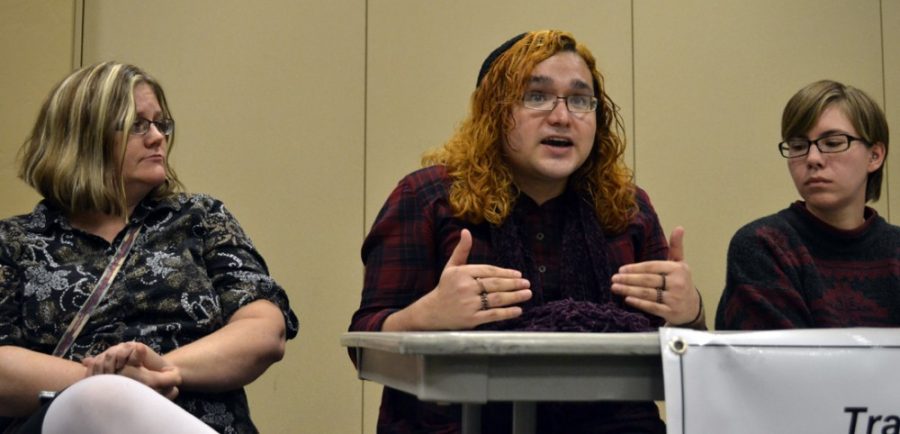Transgender individuals opened up about their lives and answered questions regarding their identities on Tuesday evening at the “Ask a Trans Person Anything Panel.”
The panelists shared their stories of when they realized they were transgender in some form.
Jai Smith, a gender queer individual, said they began questioning their identity in college, but at the age of 13, was aware they were homosexual.
“I came out when I was very young … as a young gay male, and I was really transphobic,” Smith said. “It was very much like, ‘I like men so I should be a man.’ Any expression of femininity was something I both picked on and tried to suppress as much as possible in myself, and so as a result, I was on the bullying side.”
Smith continued to say that after arriving at the UA, they began to work on the fact they were transphobic.
Jacqueline Larriva, a gender queer individual, said they were lucky growing up because in their family, they were encouraged to be a tomboy, although when treated as a woman, they felt uncomfortable.
“I think there was a moment where it was clear that pronouns made me feel uncomfortable,” Larriva said. “Like my mom would be, ‘This is my daughter,’ and I would be like, ‘Ugh, that makes me feel weird.’ Why can’t you just say, ‘This is my kid, this is my child?’ I like those neutral terms.”
AJ Born, the co-director of ASUA Pride Alliance and an agender individual, said that he didn’t really start questioning xeir gender until xey got to college. He said xey had been decidedly a girl because there was no other option for xem prior to college.
“I questioned my gender for maybe a year-and-a-half before I came out,” Born said. “I originally just came out as not a girl, because I didn’t have the language to say what I was, and it wasn’t until later on when I came across the word agender.”
Jaeline Corona, a transgender female, said that after she was adopted as a child, she had issues with the gender roles being forced on her.
“It was really difficult, because at 9, I didn’t really have the language to negotiate what I was feeling, especially in elementary school when everything is very gendered,” Corona said. “It was when I was 16. I saw pictures of — it was either my friends’ prom pictures or her quinceañera — and it clicked for me. Right then and there, because she was in this dress. It wasn’t so much about her being the center of attention [as] it was me being I wanted to wear that dress and for it to be OK.”
Aaron Wilson, a transgender male, said another person’s transition was what made him realize that he was not the gender he had been born as.
“My senior year of high school, I had a friend who started to transition,” Wilson said, “and I kind of got to experience what he was going through from a third-party perspective, and I was like, ‘Wow, that makes a lot of sense.’ The woman I was dating at the time, she was like, ‘Oh, well, why don’t we look into this and try a couple of things out?’ So, I changed pronouns and things like that, and as soon as I did, it felt very natural, and it felt very right.”
Wilson also said he had a rather privileged transition, as he was able to afford the hormone replacement therapy, whereas other transgender individuals may not be able to.
Regarding hormone replacement therapy, Larriva said they had never really considered it or gender reassignment surgery, because it just wasn’t something they felt that they wanted and that they were comfortable with their body.
“When I came to the UA,” Smith said, “I started exploring my gender identity and learning more about community and started getting very involved and started exploring my own challenges.”
_______________
Follow Ariella Noth on Twitter.









